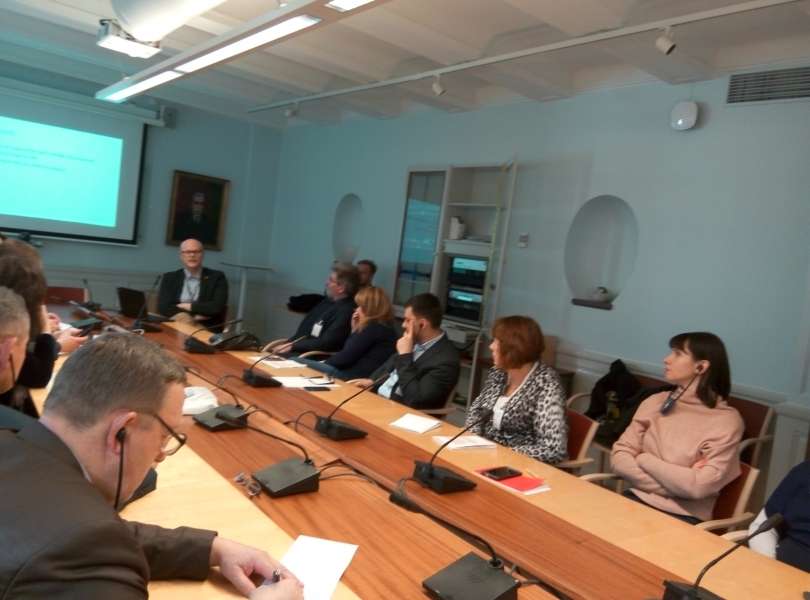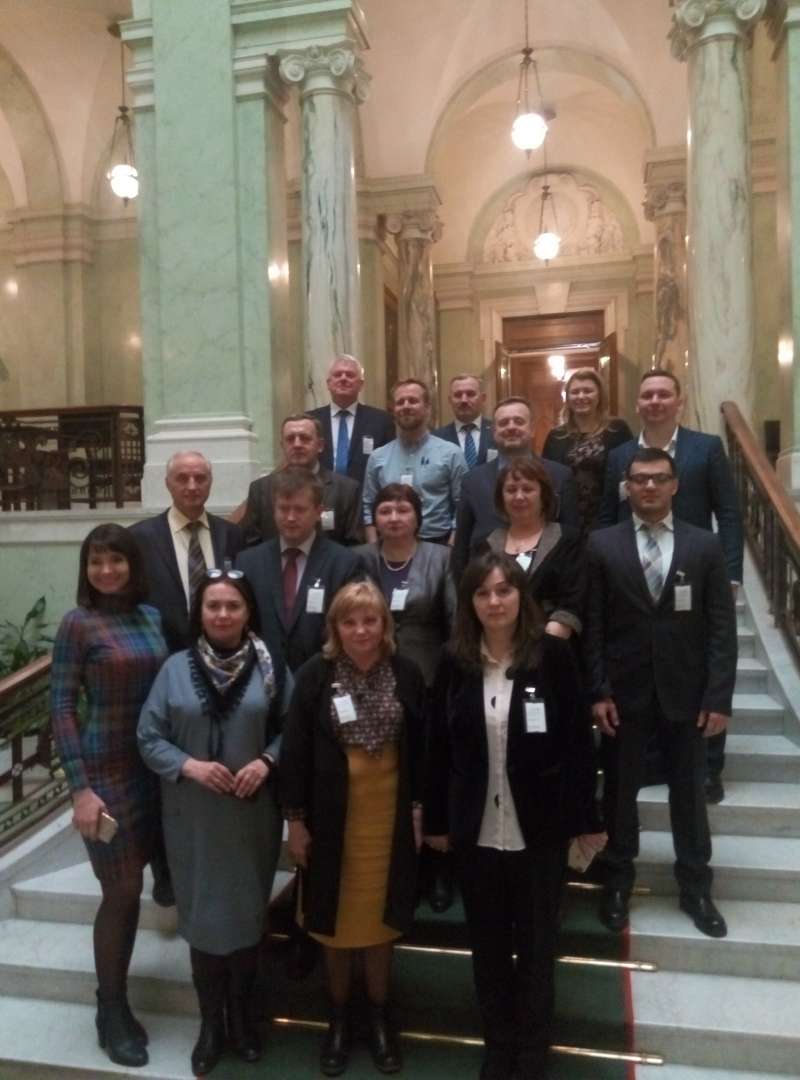A delegation of the Management of the Verkhovna Rada of Ukraine Secretariat examines the Sweden’s experience in governance and parliamentary procedures
The joint delegation of the Management and the Committee on State Building, Regional Policy and Local Self-Government is visiting Stockholm (Sweden) with an introductory working visit.
The purpose of the visit, arranged by the Swedish Association of Local Authorities and Regions (SALAR) and the Swedish-Ukrainian project 'Support to Decentralization in Ukraine' SKL International, is to familiarize with the system of governance and parliamentary procedures of Sweden – a EU-member state. Both of the above organizations have supported the implementation of the de-centralization reform in Ukraine since 2014. It should be noted that the activities of SKL International in Ukraine are funded by the Swedish International Development Agency (Sida) within the framework of the current strategy of supporting reforms in Ukraine (2014-2020).
As it was noted by the Swedish organizations’ speakers during the meetings with the Ukrainian delegation, attention has been focused on providing support for sectoral de-centralization, and namely education and financial de-centralization.
A separate emphasis was placed on the institutional capacity of the Association of United Territorial Communities and the promotion to the Committee on State Building, Regional Policy and Local Self-Government.
During the visit to the local Parliament, the Swedish Riksdag, Mr Claes Martensson, the Deputy Secretary General, briefed members of the Ukrainian delegation on the activities of its Secretariat and on the work of the parliamentary committees. There were also meetings with the leadership of the Research Service and representatives of the parliamentary group of Ukrainian-Swedish friendship.
During the meetings, members of the Ukrainian delegation not only had the opportunity to get acquainted with the peculiarities of the parliamentary procedures, but also had the opportunity to hold discussions on further advancements in reforms in Ukraine.
The role of party groups and their secretariats was discussed with the representatives of the secretariat of the Social Democratic Party, and with the head of the Personnel Department – the personnel policy and working conditions of the Parliament's staff alongside. In addition, representatives of the Ukrainian Parliament visited a debate at the Swedish Parliament.
During the visit, the UA delegates were given a general overview of the activities of the Swedish Parliament aimed at fulfilling its representative, legislative and supervisory functions. At the same time, there were certain specific issues of the legislative process, dialogue, public trust, transparency, accountability and ethics considered during the meetings.
Particular attention was paid to the issues of Parliament's relations with local and regional institutions, as well as practices and procedures for communication between the Government, Parliament and local authorities.
Worthy of note
About SALAR
The Swedish Association of Local Authorities and Regions (SALAR) is both an employers’ organisation and an organisation that represents and advocates for local government in Sweden. All of Sweden’s municipalities, county councils and regions are members of SALAR. SALAR represents and acts on their initiative.
SALAR represents the governmental, professional and employer-related interests of Sweden’s 290 municipalities and 20 county councils/regions. Its activities are mostly financed by annual member fees. SALAR is a member of the Council of European Municipalities and Regions (CEMR) and the United Cities and Local Governments (UCLG). Internationally it is considered to be one of the strongest associations of its kind. This is due to Sweden’s long tradition of decentralization and the recognition of the local political level in the country’s constitution. The Swedish local and regional levels hold significant responsibilities in delivering welfare services.
SALAR’s standing in Swedish society, along with the expertise that rests with its secretariat of 450 employees, provides a solid base of resources for SKL International in its work globally.
SALAR’s Swedish acronym is SKL, which stands for Sveriges Kommuner och Landsting.
SKL International
SKL International was founded as a subsidiary to SALAR in response to a high international demand for practical examples of Sweden’s local self-government. SKL International supports the development of local government systems in developing countries and countries in transition.
At the heart of SKL International’s services is the knowledge of Sweden’s uniquely de-centralized public sector, as well as a vast experience of de-centralization in various countries and contexts. SKL International builds its assistance on an in-depth understanding of the potential for development and is always adapted to the local context.
SKL International projects are typically associated with de-centralization reform and are often located in countries undergoing transitions of different kinds. The organization has developed an extensive international experience in areas like local democracy and governance; local and regional development; de-centralization policies; support to local government associations; European integration related services and training; and capacity building related to these areas.
Support to Decentralization in Ukraine
In April 2014 the Government of Ukraine (GoU) committed to a process of comprehensive decentralization reforms. By expanding the powers of local government bodies, the GoU intends to promote democracy, improve service delivery to citizens, and better coordinate national and local interests.
The Swedish Government has committed to support the GoU in these reform efforts. Sweden and the Nordic countries have a long history of decentralized government, public service systems and relevant experiences of local self-governance. Through the project “Support to Decentralization in Ukraine” (DSP), the Swedish Government will support the GoU in the decentralization reforms and assist the local government sector to take on more powers and responsibilities.
The DSP is being implemented by SALAR and its subsidiary SKL International, in close cooperation with several key ministries in the Ukrainian reforms, there among Ministry of Regional Development, Ministry of Education and Ministry of Finance. The DSP is a long-term commitment of the Swedish Government and it is being funded by the Swedish International Development Cooperation Agency (Sida).
Based on research and assessments during the inception phase, the DSP has the following main themes in focus for its interventions and support:
Fiscal Decentralization – The DSP interventions strives to strengthen the analytical and policy making capacities of the GoU and other Ukrainian key stakeholders with regard to fiscal decentralization. Advisory, analytical and coordination support will be provided to create a shared and more robust empirical foundation for fiscal policy making in a transformed emerging system of decentralized government.
Education – The main objective of the DSP in the education sector is a focused sustained support to the reform of education decentralization and finance and to capacity development of key education stakeholders in Ukraine. The technical entry point for the support is the national legislative requirement and new allocation formulas. The DSP interventions will address the needs and priorities in these fields, and provide advisory, analytical and capacity building support to national and local key stakeholders in education.
Communication of Reforms – Interventions of embedding and integrating principles and practice of transparency and access of information flows throughout the reform process, and improving the communication of reforms to national and sub-national stakeholders as well as to the public.
Reform Process Management & Coordination – Strengthening of inter-ministerial and
inter-institutional coordination of policy design, legal drafting and policy
implementation processes; improving individual and organizational capacities to
manage the change process.
Other fields of cooperation
may also be requested by the GoU as the project and reform process unfolds. The
DSP promotes gender equality, human rights and environmental sustainability in
all its development interventions.

